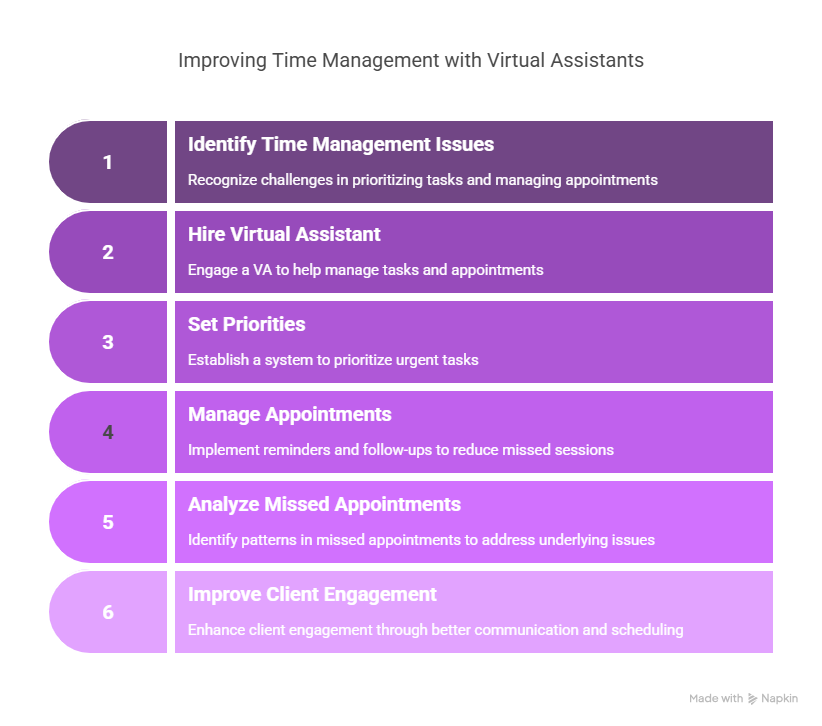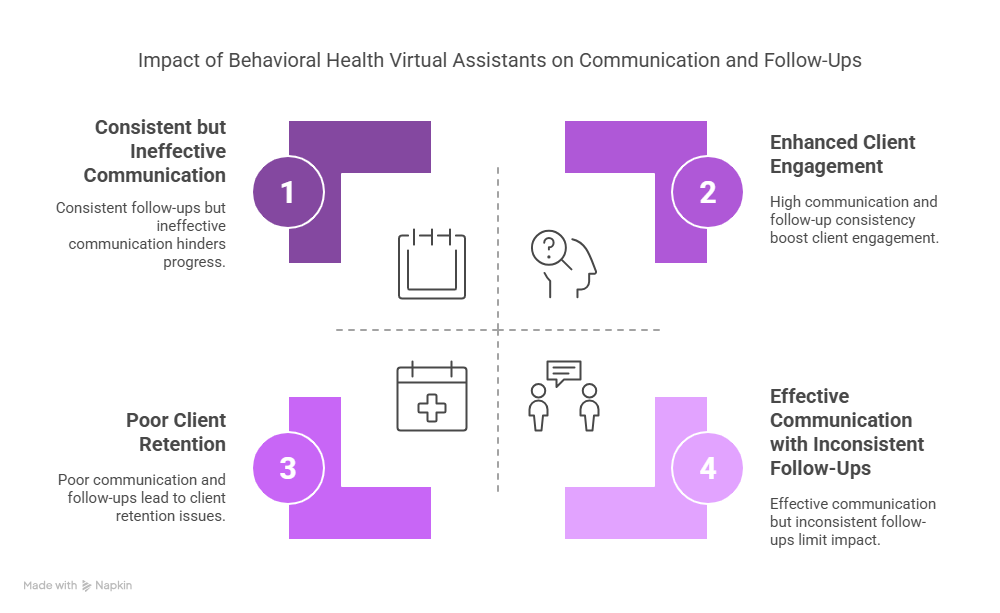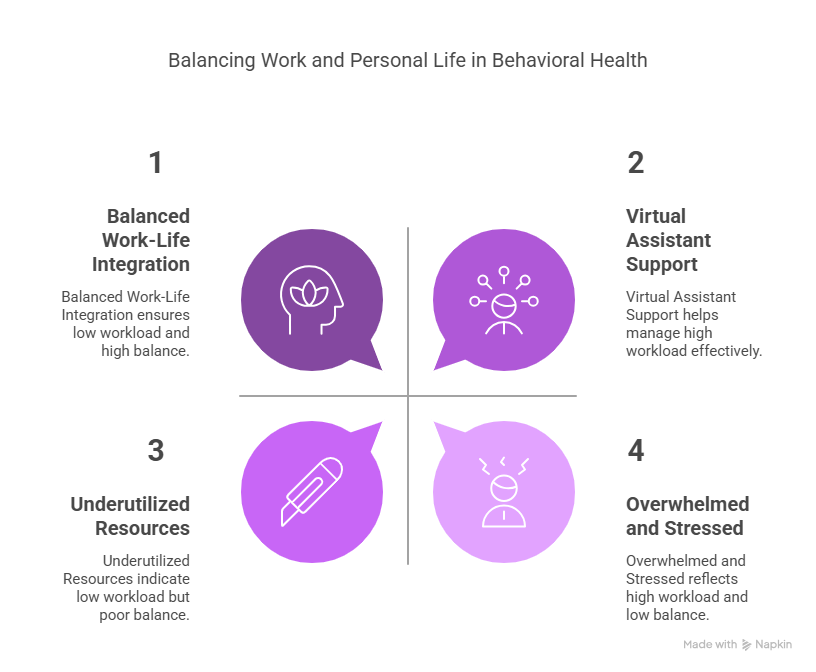10 Signs You Need a Behavioral Health Virtual Assistant to Support Your Workflow
15 Apr 2025 By: Mary Dellosa
Updated

Understanding the Role of a Behavioral Health Virtual Assistant
You likely need a behavioral health virtual assistant if admin work is taking time away from client care or causing missed sessions and slow responses. A BHVA can handle scheduling, reminders, intake, records, and follow-ups so your day runs smoothly. For example, if no-shows are rising, a VA can send automated text or email reminders and confirm appointments, helping you stay organized and reduce burnout.
They set appointments, manage records, and let therapists focus on clients. Not sure when to hire one? Here are ten signs it’s time to get a Behavioral Health Virtual Assistant.
Virtual Assistants support builds stronger patient ties. They make follow-up calls, send reminders, and gather feedback with surveys for mental health providers. This keeps clients engaged and builds trust. They also help with Newsletters and social posts can be managed by a virtual assistant for mental health. to keep your practice visible and connected.
A Virtual assistant for medical practice does more than admin work. They help set up and run telehealth services. As more therapists go virtual, behavioral health virtual assistants make sure tech works right. They fix issues fast and guide clients through the platform. This smooth setup improves the client experience and helps therapists reach more people who need care.
1. Overwhelmed by Administrative Tasks
One clear sign a behavioral health professional needs a virtual assistant is feeling swamped by admin tasks.Billing, scheduling, and record keeping can steal time from client care. Heavy workloads can cause burnout. A behavioral health virtual assistant lifts that load, letting therapists focus on clients and feel more fulfilled.
Handling patient data needs strong ethics and legal knowledge. A trained behavioral health assistant protects info and follows rules likeHIPAA, boosting client trust. They also improve communication. Virtual Assistants send follow-up reminders, talk with other providers, and deal with insurance. This cuts no-shows and keeps clients engaged. Better systems mean better care.
2. Difficulty Managing Time Effectively

Struggling with Prioritization
Time management is key in behavioral health. If tasks start to pile up, it might be time to hire a virtual assistant for mental health. They help set priorities and tackle urgent needs first.
By handing off time-heavy work, therapists gain control over their day. This boosts output and cuts stress. A behavioral health medical assistant also brings administrative support to organize daily tasks. They help balance client time with breaks and learning, which supports long-term success and wellness.
Frequent Missed Appointments
Frequent missed sessions are a clear sign of poor time management. If clients often get rescheduled or forgotten, the workflow may be broken. A virtual assistant can fix this. They send reminders and follow-ups, keeping clients in the loop. Using auto reminders by text or email, they cut no-shows and help clients stay engaged.
These tools also let clients confirm or reschedule fast. This boosts satisfaction and keeps the schedule running smooth. A virtual assistant for behavioral health can also spot patterns in missed sessions. They help uncover deeper issues like timing conflicts or client drift, so mental health professionals can act fast.
3. Increasing Patient Load
As more people seek behavioral health help, many therapists face growing client lists. While growth is good, it can also overwhelm. A behavioral health virtual assistant can ease that pressure. They handle admin work and make sure current clients still get top care. By streamlining tasks, virtual assistants help professionals keep quality high even as numbers climb.
With less time spent on paperwork, therapists can focus on care. Better time use means each client feels seen and heard. Behavioral health VAs also boost client communication. They manage reminders, follow-ups, and first contacts to ensure no one gets missed. This builds trust and stronger care ties.
4. Inconsistent Patient Communication

Delayed Responses
Good communication is key in mental health care. Delayed replies can hurt trust. A behavioral health virtual assistant keeps responses fast and consistent. They manage emails, calls, and chats so clients feel heard. This builds trust and helps clients open up, making therapy more effective.
Clients who feel valued stay engaged. behavioral health virtual assistants use tools like secure messaging and video calls to boost access and fit client needs. This flexible setup removes barriers and helps clients take part fully in their care. The result? Stronger outcomes and deeper connections.
Missed Follow-Ups
Follow-ups help track client progress in a therapy practice. If they’re often missed, it may be time for a Behavioral Health VA. They schedule and send reminders to keep care consistent. Behavioral health virtual assistants also gather feedback after sessions. This helps therapists adjust plans and improve results.
Missed follow-ups can slow progress. Behavioral health VAs use calls, texts, or emails to cut no-shows. They spot at-risk clients and help re-engage them fast. By keeping follow-ups on track, Behavioral Health VAs support steady progress and better outcomes in therapy.
5. Struggling with Technology
Technology is key in modern mental health care, but it can be hard to use. If software feels confusing, a virtual assistant can step in to help. They manage digital records and run telehealth tools, making tech easier to use. This boosts the client experience and smooths daily tasks.
6. Lack of Focus on Patient Care
Feeling Distracted
When admin tasks take over, care suffers. If paperwork distracts from clients, it’s time for support. A Behavioral Health VA handles those tasks, so therapists can focus fully on helping their clients heal.
Decreased Quality of Care
Too much admin work can lower care quality. A Behavioral Health VA keeps things running smooth, so therapists can give their best to every client.
7. Inefficient Workflow Processes
As practices grow, tasks can get messy. If systems feel slow or disorganized, a behavioral health virtual assistant can help fix that. They spot workflow issues and make things run smoother, saving time and cutting stress.
8. High Levels of Stress and Burnout

Feeling Overworked
Stress and burnout hit behavioral health professionals hard. If work feels too heavy, it’s time for help. A behavioral health virtual assistant can ease the load and smooth out daily tasks. Less stress means more job joy and better care for clients.
Impact on Personal Life
When work stress invades personal time, it’s a red flag. A Behavioral health virtual assistant can help restore balance by taking on admin duties, so you can truly unplug and recharge.
9. Difficulty Adapting to Changes in the Industry
Behavioral health keeps changing fast. If it feels hard to keep up, a virtual assistant can help. They track trends and put new rules or tools in place. With the right support, your practice stays sharp, compliant, and ahead of the curve.
10. Desire for Growth and Expansion
Setting New Goals
If you aim to grow your practice, a virtual assistant is key. They handle extra work, so you can focus on big goals. With their help, you can expand services or reach more clients without drowning in details.
Enhancing Client Experience
Hiring a virtual assistant boosts client experience. It frees up time by handling admin work and improving communication. This helps clients and grows the practice.
Trending Now
The U.S. now needs 30% more therapists due to rising mental health demands. Therapy job openings have surged, while IT and finance roles decline. This shift shows how much value society now places on mental health, especially post-pandemic. Burnout, job stress, and uncertainty have made therapy more essential in both work and personal life. Organizations are investing in mental health support to meet employee needs and improve workplace performance.
How Our Virtual Medical Assistants Support Behavioral Health Providers
Behavioral health providers face unique challenges, high patient volume, intense emotional work, and heavy admin tasks. HelpSquad’s Virtual Medical Assistants ease this burden by handling scheduling, intake, follow-ups, billing, and more. They ensure your patients stay supported while you focus on care. Our HIPAA-compliant VAs are trained in mental health workflows and provide reliable, human support that feels like part of your in-house team.
Conclusion
Spotting signs you need a behavioral health virtual assistant is the first step to better care. When stress and chaos rise, it’s time to get help. A virtual assistant handles tasks so you can focus on clients. As demand for care grows, virtual assistants matter more. They help you serve clients better and keep your work-life balance in check.
Ready to elevate your behavioral health practice and focus on what truly matters—your clients’ well-being? Let HelpSquad be the solution to your workflow challenges. Our dedicated virtual assistants and 24/7 customer service team are here to support you with administrative tasks, patient communication, and much more, all at an affordable rate starting at just $8.50 per hour. Don’t let stress and inefficiency hold you back. Start your trial with HelpSquad BPO today and experience the difference professional support can make.


